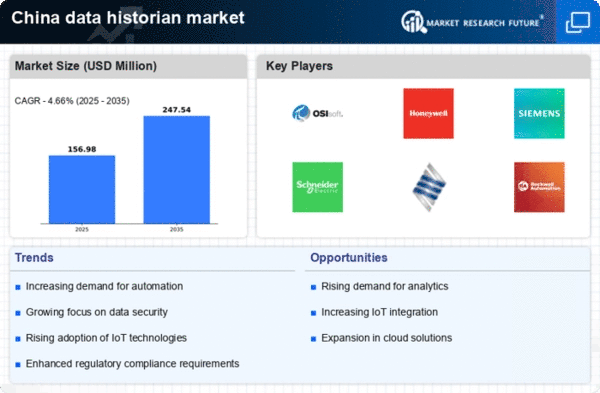Expansion of Smart Cities Initiatives
The expansion of smart cities initiatives in China significantly impacts the data historian market. As urban areas evolve into smart cities, the need for efficient data management and analysis becomes paramount. These initiatives often involve the integration of various data sources, necessitating robust data historian solutions to store and analyze historical data effectively. The Chinese government has committed to investing over $300 billion in smart city projects by 2030, which is expected to drive substantial growth in the data historian market. This investment highlights the critical role of data historians in managing the vast amounts of data generated in urban environments.
Increased Focus on Predictive Maintenance
The data historian market in China is witnessing an increased focus on predictive maintenance strategies across industries. Organizations are increasingly utilizing historical data to predict equipment failures and optimize maintenance schedules. This proactive approach not only reduces downtime but also enhances overall productivity. The predictive maintenance market is expected to reach approximately $5 billion by 2026, indicating a robust growth trajectory. As companies recognize the value of leveraging historical data for maintenance purposes, the data historian market is likely to see a corresponding rise in demand for its solutions.
Rising Demand for Real-Time Data Analysis
The data historian market in China experiences a notable surge in demand for real-time data analysis. Industries such as manufacturing, energy, and transportation increasingly rely on immediate insights to enhance operational efficiency. This trend is driven by the need for timely decision-making, which is critical in competitive sectors. According to recent estimates, the market for real-time data processing solutions is projected to grow at a CAGR of approximately 15% over the next five years. As organizations seek to optimize their processes, the data historian market is positioned to benefit significantly from this shift towards real-time analytics.
Growing Adoption of Industry 4.0 Practices
The data historian market in China is increasingly influenced by the growing adoption of Industry 4.0 practices. As manufacturers embrace automation and data-driven decision-making, the need for comprehensive data management solutions becomes evident. Industry 4.0 emphasizes the interconnectivity of machines and systems, which generates vast amounts of historical data. This trend is projected to propel the data historian market, as organizations seek to harness this data for improved operational efficiency. With an estimated market growth rate of 20% in the next few years, the data historian market is poised to play a crucial role in the realization of Industry 4.0 objectives.
Government Initiatives Supporting Digital Transformation
In China, government initiatives aimed at promoting digital transformation play a pivotal role in the growth of the data historian market. Policies encouraging the adoption of advanced technologies across various sectors are fostering an environment conducive to innovation. The Chinese government has allocated substantial funding, estimated at over $100 billion, to support the development of smart manufacturing and digital infrastructure. This investment is likely to drive the demand for data historian solutions, as organizations seek to leverage historical data for improved operational insights. Consequently, the data historian market stands to gain from these supportive measures.
















